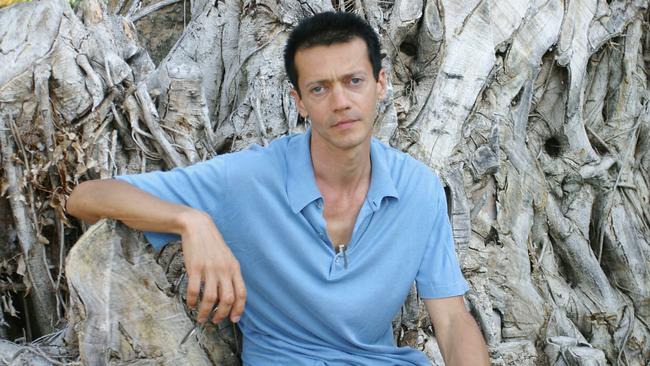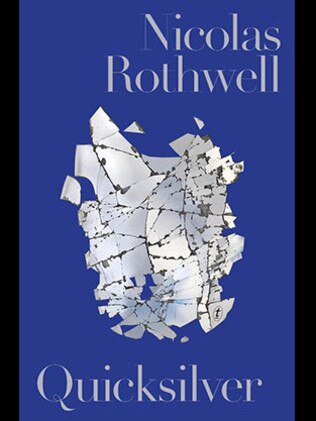Nicolas Rothwell essays range from Pilbara to Russia in spiritual quest
Nicolas Rothwell’s deeply personal essays explore the paradoxical idea that some laws are violated to be upheld.

Nicolas Rothwell is a weird and wonderful writer. In this new book, Quicksilver,he takes the form of nonfiction and turns it into an extraordinary drama of spiritual quests and cultural hauntings. The result will enthral anyone who has fallen for that recent unfolding in literature — it’s there in that master of dark ironic arts, Thomas Bernhard, or in the great WG Sebald — where the details and detours of what might be belletristic writing are invested with the ravishing intensity of lyric poetry.
Rothwell is also a God-botherer, a man on a sustained spiritual quest who has transported a sensibility positively marinated in artistic apprehension to the stark realities and meditative opportunities of life in the centre, to the depiction of deserts and indigenous people. But Quicksilver is a shortish book of what purports to be prose that has the vertigo-inducing ambitions of Wordsworth’s The Prelude. It is full of dark enchantments.

We begin in the red desert with Rothwell driving west towards the Pilbara and remembering the expedition of Colonel Peter Egerton Warburton, who found the desert engulfed overnight by a flood of water 300m wide. Rothwell comes across the kind of lizard Warburton encountered and is reminded of Leo Tolstoy and the Black Sea gecko in Yalta. According to Maxim Gorky, Tolstoy looked at the lizard and said, “Are you happy?” And, when the gecko just gazed back, said to it: “Well, I’m not.”
Gorky howled in his grief when the great man died, and spoke of how he went off into a high, wild place and looked into the face of death, the red light of what should not be. Rothwell recounts the saga of Gorky lionised by the Bolsheviks, the city renamed for him, of how Joseph Stalin, that engineer of souls, was a pallbearer at his funeral, of how he probably had him killed. Then we pass, in a characteristic Rothwell move, to the fact Andrei Sakharov, the great dissident nuclear physicist, was exiled to Gorky and how Rothwell went there, ostensibly to look at the shrines and churches but, in fact, in quest of the faith of the man of science who wrote, “I am unable to imagine the universe without some guiding principle, without a source of spiritual warmth.”
And so our author gets from a glance at a lizard a sense that the same light shines in the desert where the kites climb upwards and no answer comes in the sand, amid the bloodwoods and the rivergums.
Rothwell collocates different kinds of isolation, different forms of desert spaces. Think of AD Hope’s triumphalist phrase about Australia (that it is still from the desert that the prophets come) and consider Rothwell’s apprehension that every heart is a desert place, and that everyone stares into the red light they would reject.
For Rothwell there must always be faith in the life spirit, some faith in faith. The title essay, Quicksilver, recalls the author’s childhood in the High Tatra mountains of Slovakia and astronomer Antonin Becvar and his extraordinary Atlas Coeli, a geography of the stars.
Rothwell’s childhood was a time of dictatorships and totalities falling, a “molten” time for the world and for a young man driving through a land of graveyards. And it is in one of these that a photographer shows him the tombstone of his grandfather and tells him it is a Frankist tomb.
Jacob Frank was a would-be Jewish messiah of the late 18th century whose story is tied up with the enigmas and allegories of the Kabbalah, with its intimation of a fall that must be embraced to its last jot and tittle of sin and falseness. Frank took on the ethic of the charade Messiah, the man of power whose followers indulge in orgies and convert en masse to the outer forms of Catholicism.
He died in 1791 and sounds like a figure from a mad dream, though he was the subject of a study by Gershom Scholem, the greatest 20th-century authority on the Kabbalah. His essay on Frank, Redemption Through Sin, is fascinated by the enunciation of heresy, of the idea that only by violating the law could the law come to be accomplished.
Frank was a figure of satanic intensity and personal power. The great scholar saw him as someone who drank the cup to the dregs. And, yes, our author knows this echoes, guess who? It’s a vision not of a kingdom of God on earth but of malignant angels and demiurges and bringers of death.
So why discuss this man who seems to prefigure the shadow of Adolf Hitler and Stalin and the Holocaust? Because in 1937 Helmut Petri, a disciple of the German ethnographer Leo Frobenius, went to the Kimberley and wrote an account there of a study of a culture at the point of collapse and revolt.
The Kimberley tribes began a cult of Kurangara, one that involved the articulation of hidden and forbidden things. The cult had its source in the centre where the djanba, the spirits of the inland dryness, the fearful ones, fair-skinned and long-bearded, travelled at speed, most potent when no moon shone, hungry for water and human blood, sex and defilement. It was a cult of magic in a time of trouble.
Rothwell writes that we forget that Aborigines in traditional societies think the whitefellas eventually will leave. He is the opposite of conventional. He emphasises that the bygone phase of white interaction with the blacks, the missionary one, was far more in tune with their vision because it rested on a belief in the workings of the will of God. It was followed by the age of do-gooders and administrators who have no conception of such things.
But the point of the Kurangara revolt was it had a widespread influence on the Western Desert art movement. It led to the spilling of secrets. Then “a solution was devised: dots and linear patterns were used by the painters to mask the secret symbols on their boards and canvases; as in Kafka’s parable of the leopards in the ancient temple, soon those surface decorations became the heart of the work”.
Rothwell sees the movement as quintessentially an art of desecration and revelation, “a gesture of religious rebellion born of defiance and despair”. “The artists were displaying their designs: they were profaning them.”
For Rothwell, the blasphemy is part of the quicksilver that will not stay in place. He talks of a journey with two indigenous men. Are they not afraid of spirits? No, they say, they are the spirits. They are the controllers of rain, fire and water. A shooting star falls, it gleams, and the two men begin to sing in the old high language.
What are we to make of all this? It is a kind of erudite romance Rothwell is indulging in — and it’s hard to deny the romance or the self-indulgence. A privileged childhood, a Messianic Jewish horror story and then the insinuation that the great Aboriginal paintings with their signature dots miming and blanking a revelation that cannot be made and must be made. This is yarn-spinning of a high order and it would seem to express an elevated and thrilling madness.
How can these things be cognate? How can there be correspondences between them except in the romancing mind of Rothwell, whose quicksilver is inseparable from the brilliance of fiction but who also likes to make our flesh creep. Is this psychedelic fabulism before it’s anything else, including the shadow of the things of religious wisdom?
Well, maybe, but old and mighty faiths do break their moulds — think of Islamic State — and there is also something uncanny about the brilliance with which Rothwell suggests the Western Desert paintings could be an act of heresy and a reaching out towards modernism and the reconciling spirit of an uncomprehending, deeply receptive white Australia.
It’s too easy to say Rothwell speaks a language beyond the level of our dreams, though it’s undeniable that his own dreaming, his articulation of a mythology that might otherwise be private, would be madness if it were carried a step further to insist on an equation rather than a correspondence. As it is we can only be grateful, if a bit bewildered, for the imagination that informs this intelligence. He leads us through Andrei Tarkovsky’s 1979 film Stalker, which “lasted a long time in the mind” and opened up the idea of the desert to him. “And life’s faintest trace is always the most beautiful; the harshest landscape is the loveliest.”
Rothwell is a writer who can alienate any reader because he can seem so swaddled in the connoisseurship of his own predicament that it’s easy for the stylishness of the words to blind us to the seriousness of the obsessions. His forebear is Bruce Chatwin, the exquisite Englishman who came to Australia and wrote The Songlines. But he also brings to Australian consciousness the awareness of the Europe that was transported here. That’s partly because he is a Europeanised Australian who has come home to the ultimate refinements of a desert place, a centre that keeps moving in and out of focus as an inhabited reality and a metaphor for his own quest.
Christ told the rich young man, the one he liked, to move a step ahead of his devotion to the commandments and to sell all he had and hand it to the poor. Rothwell is, in terms of cultural baggage and cultural dazzle, rich indeed, and a lot of Quicksilver is a long farewell to the riches of the earth that is also an accommodation with indigenous people and desert places. But there is also the Rothwell who wants to rhapsodise about how the geography of Australia had to involve a mighty European imagining. He’s everywhere alive to the shadows of Ludwig Leichhardt and Thomas Mitchell and Patrick White and Claude Levi-Strauss and Eric Rolls.
Rothwell is a dazzling essayist because he is not really an essayist at all. He is someone who uses nonfiction as his palette for an art that is full of the kinds of associations and transitions traditionally associated with poetry. Is there a risk of pretentiousness in this? Of course there is. He can sound luvvyish when he bangs on about outsider art, for example. But the criticism is unfair, however inevitable it may seem, because Rothwell is in fact a literary artist in the same sense as Sebald, one who speaks of the spirit and shows us a mystery.
Peter Craven is a cultural critic.
Quicksilver
By Nicolas Rothwell
Text Publishing, 195pp, $29.99 (HB)



To join the conversation, please log in. Don't have an account? Register
Join the conversation, you are commenting as Logout